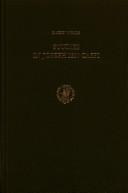| Listing 1 - 3 of 3 |
Sort by
|
Book
ISBN: 9004350152 9789004350151 9789004338227 9004338225 Year: 2017 Publisher: Leiden Boston
Abstract | Keywords | Export | Availability | Bookmark
 Loading...
Loading...Choose an application
- Reference Manager
- EndNote
- RefWorks (Direct export to RefWorks)
Joseph Ibn Kaspi was among the most prolific philosophical writers in one of the most vibrant, productive, creative periods in the history of Jewish philosophy. Born around 1280 in Provence, Ibn Kaspi penned works engaging a broad range of fields, including philosophy, theology, grammar, logic, biblical exegesis, and interreligious polemics. In Joseph Ibn Kaspi: Portrait of a Hebrew Philosopher in Medieval Provence , Adrian Sackson asks the question: What was Ibn Kaspi’s overarching intellectual project? The book focuses on several key themes: Ibn Kaspi’s conception of the formative (not just discursive) function of philosophy; his multi-layered esotericism; his distinct approach to the interpretation of Maimonides; his Maimonidean-philosophical approach to the interpretation of religious texts and practices; his Platonic political thought; his approach to messianism, and his attendant conception of the nature of human history.
Jewish philosophers --- Philosophy, Medieval. --- Medieval philosophy --- Scholasticism --- Philosophers, Jewish --- Philosophers --- Caspi, Joseph, --- Argentière, En Bonafoux del', --- Bonafoux del'Argentière, En, --- Bonfos, Joseph, --- Caspi, Joseph ben Abba Mari, --- En Bonafoux del'Argentière, --- Ibn Kaspi, Joseph, --- Joseph Caspi ben Abba Mari, --- Kaspi, Joseph ben Abba Mari ibn, --- Kaspi, Yosef ibn, --- Yosef ibn Kaspi, --- אבן כספי, יוסף --- אבן כספי, יוסף, --- כספי, יוסף --- כספי, יוסף, --- כספי, יוסף אבן --- יוסף אבן כספי
Book
ISBN: 1438476043 1438476035 9781438476049 9781438476032 Year: 2019 Publisher: Albany : SUNY Press,
Abstract | Keywords | Export | Availability | Bookmark
 Loading...
Loading...Choose an application
- Reference Manager
- EndNote
- RefWorks (Direct export to RefWorks)
The philosopher and biblical commentator Joseph Ibn Kaspi (1280–1345) was a provocative Jewish thinker of the medieval era whose works have generally been overlooked by modern scholars. Power and Progress by Alexander Green is the first book in English to focus on a central aspect of his work: Ibn Kaspi's philosophy of history. Green argues that Ibn Kaspi understood history as guided by two distinct but interdependent forces: power and progress, both of which he saw manifest in the biblical narrative. Ibn Kaspi discerned that the use of power to shape history is predominantly seen in the political competition between kingdoms. Yet he also believed that there is historical progress in the continuous development and dissemination of knowledge over time. This he derived from the biblical vision of the divine chariot and its varied descriptions across different biblical texts, each revealing more details of a complex, multifaceted picture. Although these two concepts of what drives history are separate, they are also reliant upon one another. National survival is dependent on the progress of knowledge of the order of nature, and the progress of knowledge is reliant on national success. In this way, Green reveals Ibn Kaspi to be more than a mere commentator on texts, but a highly innovative thinker whose insights into the subtleties of the Bible produced a view of history that is both groundbreaking and original.
Jewish philosophy. --- Philosophy, Medieval. --- History --- History, Modern --- Medieval philosophy --- Scholasticism --- Jews --- Philosophy, Jewish --- Philosophy, Israeli --- Philosophy. --- Philosophy --- Caspi, Joseph, --- Argentière, En Bonafoux del', --- Bonafoux del'Argentière, En, --- Bonfos, Joseph, --- Caspi, Joseph ben Abba Mari, --- En Bonafoux del'Argentière, --- Ibn Kaspi, Joseph, --- Joseph Caspi ben Abba Mari, --- Kaspi, Joseph ben Abba Mari ibn, --- Kaspi, Yosef ibn, --- Yosef ibn Kaspi, --- אבן כספי, יוסף --- אבן כספי, יוסף, --- כספי, יוסף --- כספי, יוסף, --- כספי, יוסף אבן --- יוסף אבן כספי

ISBN: 9004042210 Year: 1975 Volume: 8 Publisher: Leiden Brill
Abstract | Keywords | Export | Availability | Bookmark
 Loading...
Loading...Choose an application
- Reference Manager
- EndNote
- RefWorks (Direct export to RefWorks)
Philosophy, Medieval --- Philosophy, Jewish --- Caspi, Joseph --- 296*62 --- Fourteenth century --- 14th century --- Middle Ages --- Medieval philosophy --- Scholasticism --- Jews --- Philosophy, Israeli --- Joodse theologie en filosofie in de middeleeuwen --- Philosophy --- Jewish philosophy. --- Philosophy, Medieval. --- 296*62 Joodse theologie en filosofie in de middeleeuwen --- Jewish philosophy --- Caspi, Joseph, --- Argentière, En Bonafoux del', --- Bonafoux del'Argentière, En, --- Bonfos, Joseph, --- Caspi, Joseph ben Abba Mari, --- En Bonafoux del'Argentière, --- Ibn Kaspi, Joseph, --- Joseph Caspi ben Abba Mari, --- Kaspi, Joseph ben Abba Mari ibn, --- Kaspi, Yosef ibn, --- Yosef ibn Kaspi, --- אבן כספי, יוסף --- אבן כספי, יוסף, --- כספי, יוסף --- כספי, יוסף, --- כספי, יוסף אבן --- יוסף אבן כספי
| Listing 1 - 3 of 3 |
Sort by
|

 Search
Search Feedback
Feedback About UniCat
About UniCat  Help
Help News
News